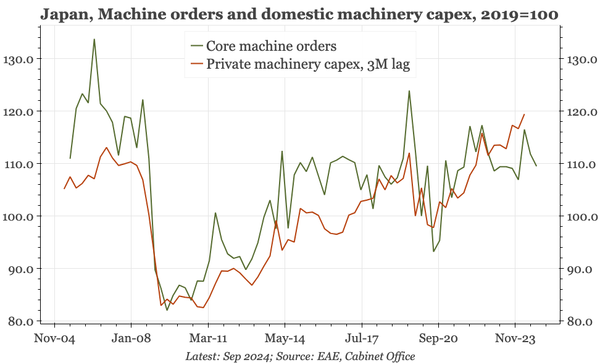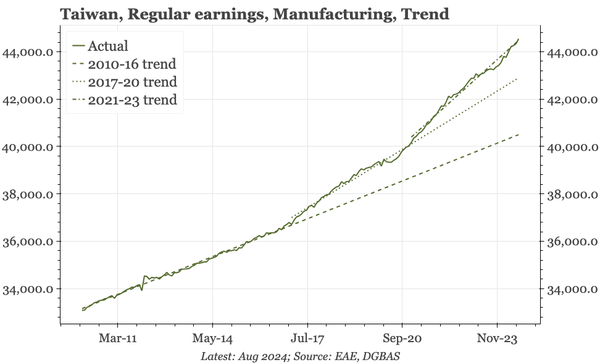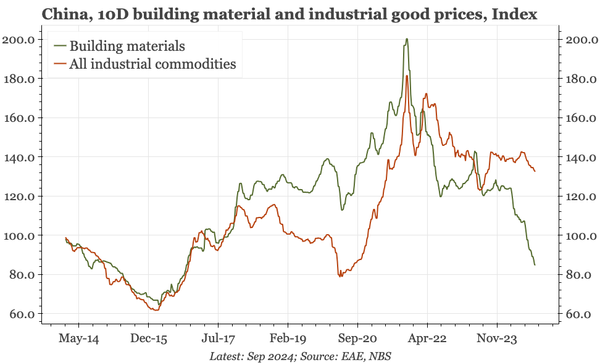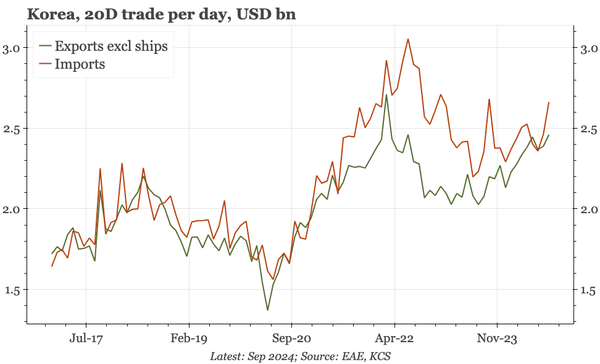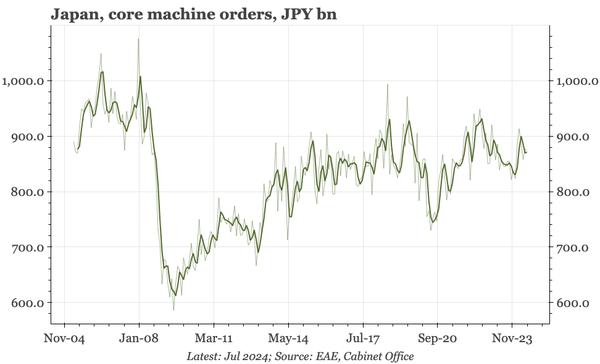Japan – household incomes bounce
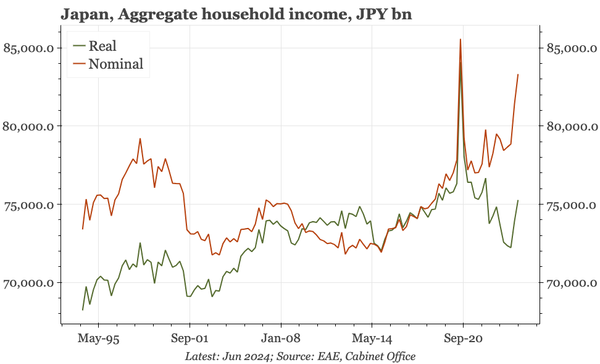
Household incomes bounced in 1H24, boosted by fiscal policy (welfare benefits and Kishisha's tax cuts), as well as property income and solid wage growth. This is an important change, given the big problem with aggergate demand has been the weakness of consumption.
Taiwan – US trade surplus now over 10% GDP
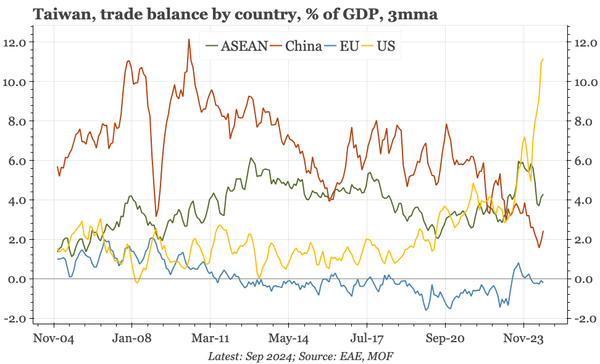
Much has been made of the US overtaking China as Taiwan's biggest market. One consequence is a surge in the trade surplus with the US to over 10% of GDP. That will likely attract a lot more political attention in the event of a Trump re-election.
Japan: consumption slows again
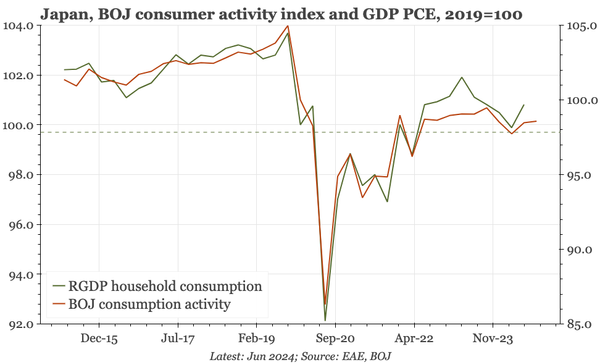
After a better Q2, consumption looks to have basically flat-lined again in July-August, capping any upside in GDP. Consumption isn't falling again, and last week's consumer confidence survey suggests no new deterioration in September. But there is downside risk if the JPY continues to weaken.
Asia – PMIs suggest end of recovery

It wasn't just in Taiwan. Korea's PMI also fell sharply last month. The deterioration is puzzling, not being seen in other surveys, nor in Korea's September exports. So probably, it is noise. But data patchiness has been a theme of recent months, suggesting underlying cycles are rather so-so.
Korea – private services CPI rises to 3%
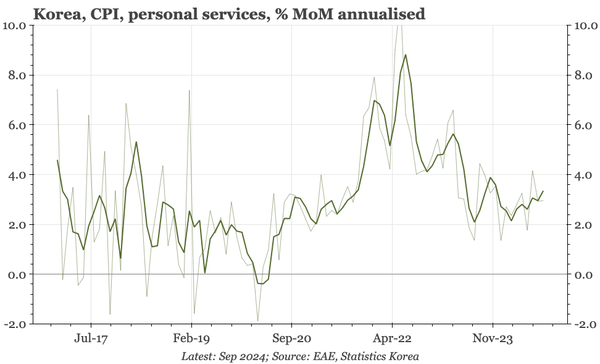
Data today show headline inflation fell below the BOK's 2% target in September for the first time since April 2021. But core inflation isn't continuing to drop. Sequential core looks to be bottoming around 1.8%, and the rebound in personal services inflation is continuing, from 2% in Q1 to 3% now.
Taiwan – PMI back below 50
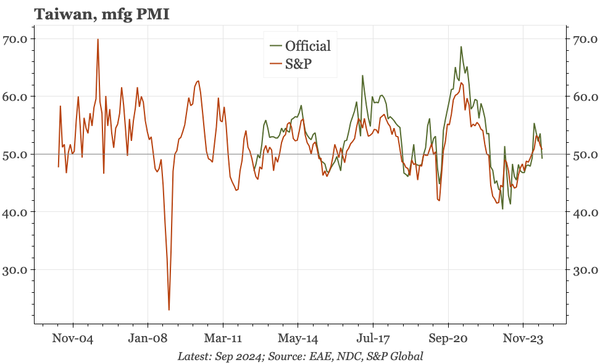
Taiwan manufacturing should be on a big upswing, driven by recovery from the 2022-23 recession, and AI demand for semis. And yet, even before now, data have been patchy, and the PMIs suggest that mfg started to contract again in September. If that's the end of the upturn, it didn't last long.
China – Equities, the YC and FCI

The equities move has been extreme. To argue that this heralds broader economic recovery relies on: 1) the YC moving next as savings get mobilised; 2) the YC mattering less as an indicator than equities. Both are possible, but while the YC has issues as a leading indicator, so does the stockmarket.
Japan – Tokyo underlying CPI stable
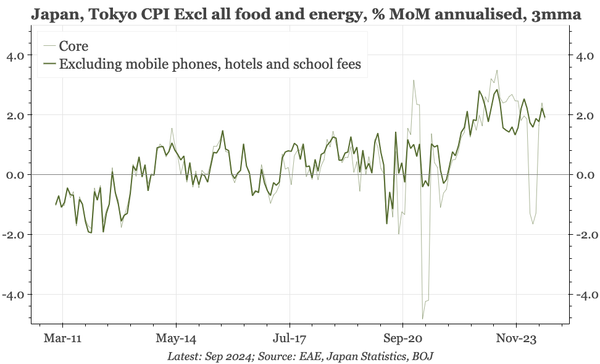
Underlying core inflation in Tokyo in September continued to run at around a 2% annualised rate. The trimmed mean has stabilised at a bit below that, and the proportion of rising items has ticked up. Inflation isn't accelerating, but there's no sign of a slowdown either.
China: profit share as low as 2009
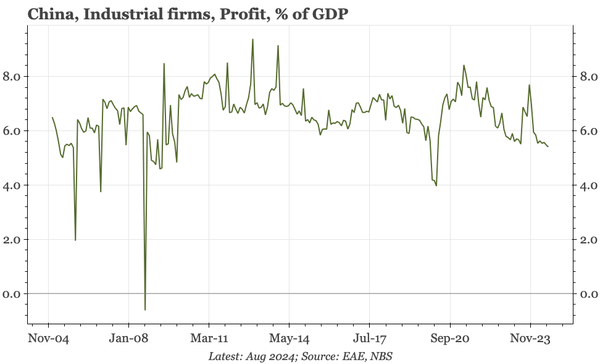
The 17% YoY fall in profits in August is exaggerated by comparison with the spike 12M previously. But the details are sluggish. Corporate revenues haven't yet regained the level of November 2023, and except for early 2023, the profit share of GDP is lower than any time since 2009.
China – exports amazingly strong; imports remarkably weak
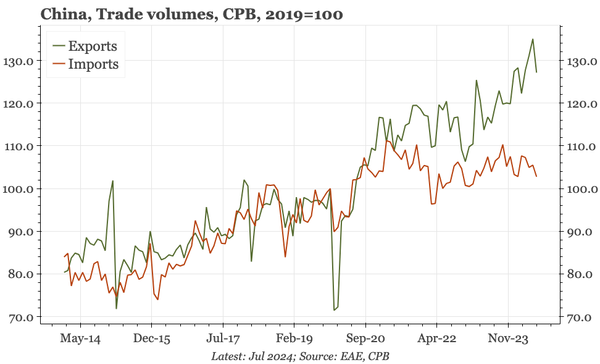
That data in the last few months show export volumes growing faster than pre-covid rates is remarkable. But equally significant for China and the world is the total stalling of imports. Before 2020 they were growing with exports, but since then, they haven't risen at all.
Taiwan – much stronger in August
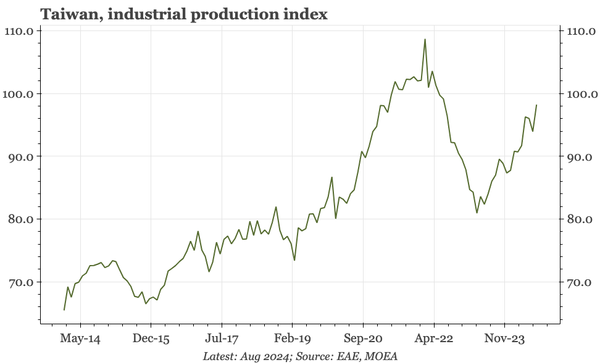
After a sluggish Q2, we'd started to think the best of Taiwan's recovery was over. But IP data today, as well as export volumes, are consistent with the big bounce seen in August export values. Retail sales were weaker, but still suggest much more resilience than consumption in Korea.
Japan – upstream services inflation steady
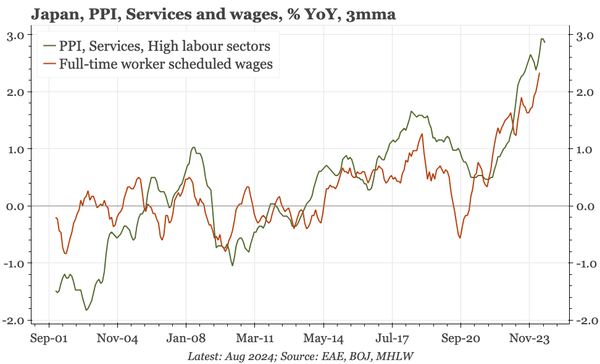
Services PPI inflation eased back in August, but that was partly base effect. The BOJ's new high-labour content measure isn't that different, and remains near 3%. Sequentially, SPPI is running around 2%, but all the volatility since 2022 makes it difficult to discern the underlying trend.
Taiwan – mild export upturn intact
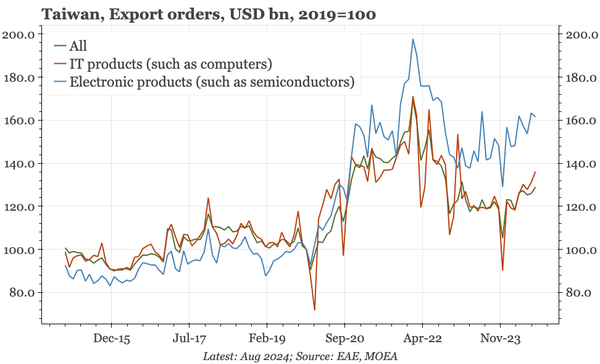
August export order data don't signal any change in direction in the modest export upturn of recent months. The more interesting shifts are structural. China orders are flat, and are now only 60% of US levels. The overseas production ratio is the lowest since 2009.
Japan – firm services PMI, higher output prices
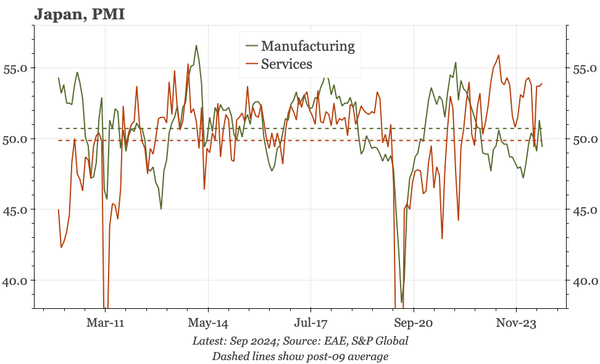
There's still little sign of economic damage from the market volatility of July and early August. Like other surveys, today's flash services PMI was strong. Input prices eased, but output prices didn't as "firms looked to pass higher cost burdens in to clients".
China – the flood into time deposits isn't slowing
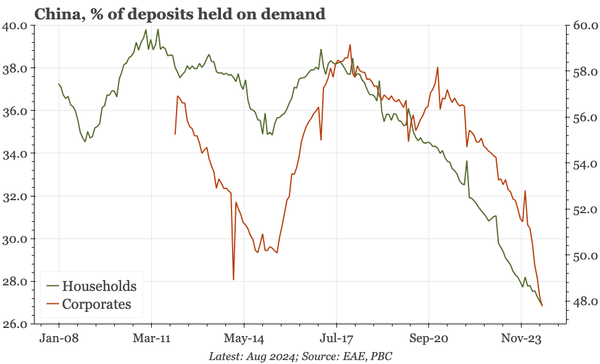
While data for the corporate sector are distorted by regulatory changes, this is still one of the most important charts for China macro. As long as companies and especially households are locking up their money in time deposits, it is highly unlikely that inflation and nominal growth rebound.
Japan: still no lift in export volumes
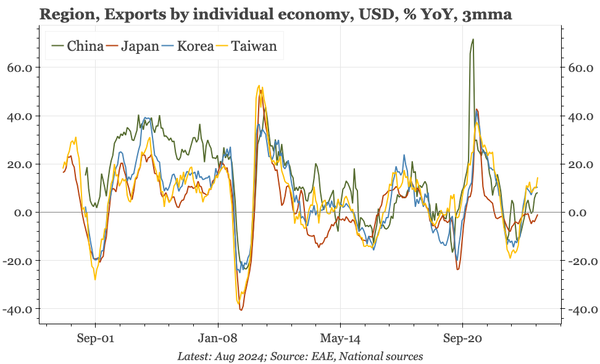
Japan's exporters haven't reacted in standard fashion to JPY weakness, not cutting prices to increase volumes. Indeed, volumes fell YoY in August. That contrasts with the clear recovery in the rest of the region. It means higher JPY earnings for exporters, but less incentive for domestic capex.
Taiwan – no slowdown in property prices
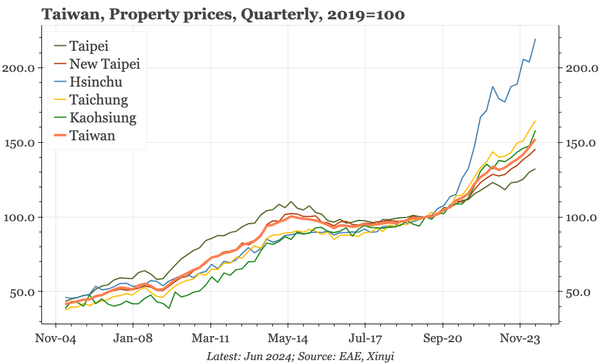
Exports feel a bit peaky, and CPI inflation has eased. But property price inflation isn't cooling. Perhaps an export slowdown changes that – the fastest price gains are in Hsinchu, home of TSMC. But unless and until that happens, it is very difficult for the central bank to turn doveish.
QTC: China – retirement age rising less clearly than longevity
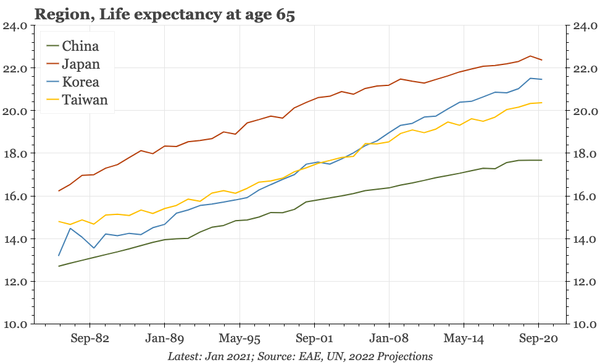
This week's announced rise in the retirement age is economically welcome. But the rise of 3-5 years, implemented over 15 years, is modest. In that time longevity is likely to rise almost as much, meaning by the time this week's changes are completed, China will still be at square one.
QTC: Japan – import prices falling
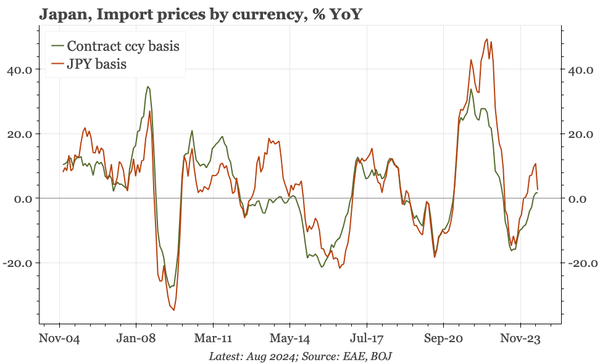
The shift in $JPY is clearly having an impact, with JPY import price inflation dropping from July's +10.8% YoY to just 2.6% in August. But BOJ officials suggest they remain confident in the underlying outlook, which isn't unreasonable given the resilience of survey data such as today's BSI.
QTC: Japan – labour market still tightening
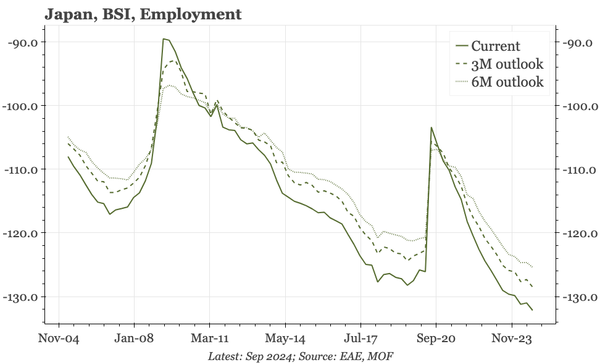
A critical part of the BOJ's positive narrative is the labour market tightness shown by the Tankan. That survey will be released next in early October, but early signs are positive, with today's BSI survey from the MOF, also quarterly, showing tightening over all three of its measurement periods.

